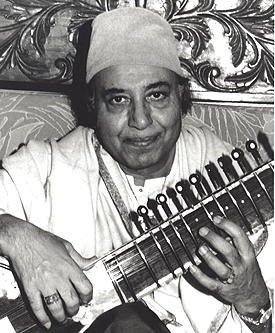World-renowned sitar player Imrat Khan, a distinguished artist-in-residence in the Department of Music in Arts & Sciences, will be joined by virtuoso tabla player Samir Chatterjee for a concert of Indian classical music at 8 p.m. March 25 at Edison Theatre.
Khan is widely recognized as one of the giants of Indian classical music, celebrated for his virtuosity, musicality and inventive wit.

Born in Calcutta in 1936, Khan is the senior-most member of the famous Etawa Gharana (musical dynasty), which includes a long line of illustrious Ustads (master musicians) dating back to the 16th-century court of Mogul Emperor Akbar. In addition to his renown as a sitar player, The New Grove Dictionary of Music and Musicians describes Khan as “the greatest living exponent of the surbahar, a bass version of the sitar developed by his great-grandfather Sahabdad Khan.”
Khan’s grandfather Imdad Khan and father, Enayat Khan, were leading sitar and surbahar players of their day, as was his elder brother, Vilayat Khan, who guided Imrat’s early training. In 2006, Khan’s four sons — also musicians — joined their father in performances at Queen Elizabeth Hall in London and at the Tata Theater in Mumbai to celebrate Khan’s 70th birthday.
Khan has toured extensively in India and the United States and throughout Europe, Asia and South America. In 1971, he became the first Indian musician to play in a BBC Proms concert. In 1979, he presented Europe’s first all-night concert of Indian classical music at the National Gallery in Berlin. He has recorded more than 24 albums, and his work has been featured in films by Satyajit Ray and James Ivory, among others.
In 1988, Kahn received India’s highest musical honor, the Sangeet Natak Akademi Award. He joined the WUSTL faculty in 1990 and resides in St. Louis.
Chatterjee, a faculty member in jazz and percussion at the Manhattan School of Music, has performed with major Indian musicians worldwide and served as an important force in the fusion of Indian and Western music. He is a member of the jazz trios Sync and Manodharma as well as founder and director of Chhandayan, an organization dedicated to promoting and preserving Indian music and culture.
Indian classical music often is likened to jazz in that it is unwritten and improvised in concert. However, this “improvisation” is developed according to rules and traditions that are no less rigorous than those observed by classical Western composers. Training for Indian musicians usually begins in early childhood and always involves the oral transmission of the artistic heritage known as gharana, or “house of tradition,” directly from teacher to pupil.
The Indian sitar is a long-necked, fretted instrument with multiple strings, some used for melodic purposes, others used to create a drone. Sitar performances are noted for the use of rapid plucking techniques and are frequently accompanied by the tabla, a paired-type of North Indian drums.
The music itself is comprised of three essential elements: the sur, or the pitch and tone of a musical note; the tala, which defines the metric and rhythmic construction; and most importantly, the raga, which refers to the scales or ordering of notes around which the music is formed. Performances typically open with a lone sitar, which is gradually joined by the tabla and other instruments as the melody develops.
The performance is sponsored by the music department. Tickets are $15; $10 for seniors, faculty and staff; and $5 for students.
For more information, call 935-6543.